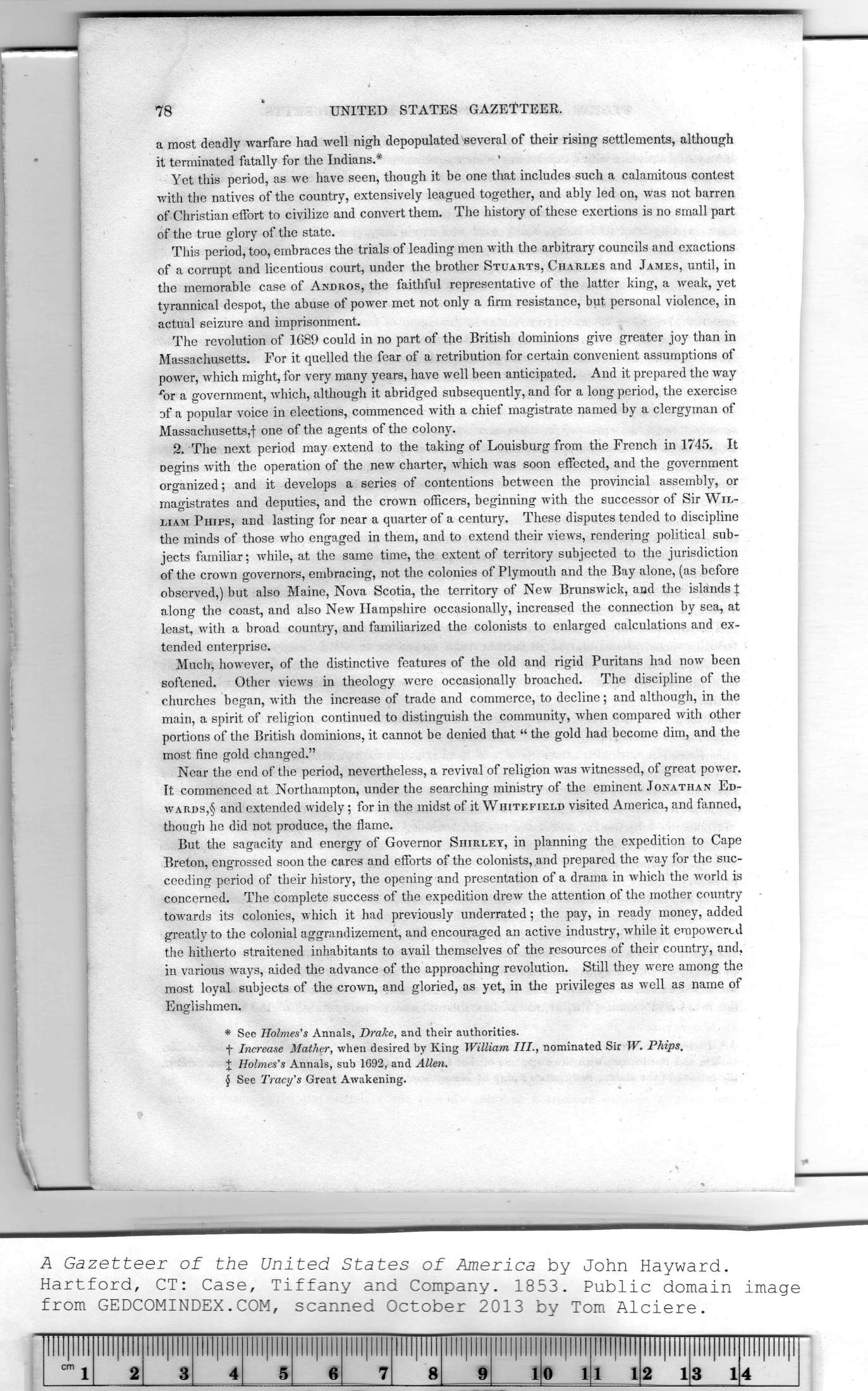|
|
Note: Ctrl and + increases the font size of the text below, Ctrl and - decreases it, and Ctrl and 0 resets it to default size.
78 UNITED STATES GAZETTEER.
a most deadly warfare had well nigh depopulated several of their rising settlements, although
it terminated fatally for the Indians.*
Yet this period, as we have seen, though it be one that includes such a calamitous contest
with the natives of the country, extensively leagued together, and ably led on, was not barren
of Christian effort to civilize and convert them. The history of these exertions is no small part
of the true glory of the state.
This period, too, embraces the trials of leading men with the arbitrary councils and exactions
of a corrupt and licentious court, under the brother Stuarts, Charles and James, until, in
the memorable case of Andros, the faithful representative of the latter king, a weak, yet
tyrannical despot, the abuse of power met not only a firm resistance, but personal violence, in
actual seizure and imprisonment.
The revolution of 1689 could in no part of the British dominions give greater joy than in
Massachusetts. For it quelled the fear of a retribution for certain convenient assumptions of
power, which might, for very many years, have well been anticipated. And it prepared the way
ror a government, which, although it abridged subsequently, and for a long period, the exercise
of a popular voice in elections, commenced with a chief magistrate named by a clergyman of
Massachusetts,f one of the agents of the colony.
2. The next period may extend to the taking of Louisburg from the French in 1745. It
Degins with the operation of the new charter, w'hich was soon effected, and the government
organized; and it develops a series of contentions between the provincial assembly, or
magistrates and deputies, and the crown officers, beginning with the successor of Sir Wil-
liam Phips, and lasting for near a quarter of a century. These disputes tended to discipline
the minds of those who engaged in them, and to extend their views, rendering political sub-
jects familiar; while, at the same time, the extent of territory subjected to the jurisdiction
of the crown governors, embracing, not the colonies of Plymouth and the Bay alone, (as before
observed,) but also Maine, Nova Scotia, the territory of New Brunswick, and the islands J
along the coast, and also New Hampshire occasionally, increased the connection by sea, at
least, with a broad country, and familiarized the colonists to enlarged calculations and ex-
tended enterprise.
Much, however, of the distinctive features of the old and rigid Puritans had now been
softened. Other views in theology were occasionally broached. The discipline of the
churches began, with the increase of trade and commerce, to decline; and although, in the
main, a spirit of religion continued to distinguish the community, when compared with other
portions of the British dominions, it cannot be denied that “ the gold had become dim, and the
most fine gold changed."
Near the end of the period, nevertheless, a revival of religion was witnessed, of great power.
If, commenced at Northampton, under the searching ministry of the eminent Jonathan Ed-
wards^ and extended widely; for in the midst of it Whitefield visited America, and fanned,
though he did not produce, the flame.
But the sagacity and energy of Governor Shirley, in planning the expedition to Cape
Breton, engrossed soon the cares and efforts of the colonists, and prepared the way for the suc-
ceeding period of their history, the opening and presentation of a drama in which the world is
concerned. The complete success of the expedition drew the attention of the mother country
towards its colonies, which it had previously underrated; the pay, in ready money, added
greatly to the colonial aggrandizement, and encouraged an active industry, while it empowered
the hitherto straitened inhabitants to avail themselves of the resources of their country, and,
in various ways, aided the advance of the approaching revolution. Still they were among the
most loyal subjects of the crown, and gloried, as yet, in the privileges as well as name of
Englishmen.
* See Holmes's Annals, Drake, and their authorities.
t Increase Mather, when desired by King William III., nominated Sir IF. Phips.
J Holmes's Annals, sub 1692, and Allen.
§ See Tracy's Great Awakening.
|
